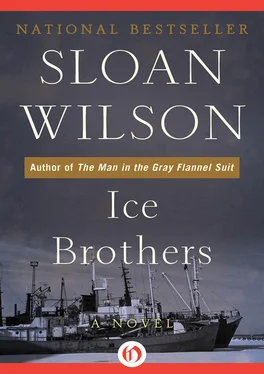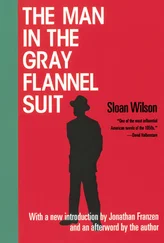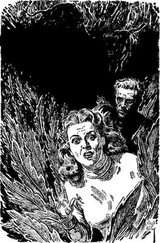“At least the son of a bitch knows better than to get too close,” Mowrey said and rang up full speed as he headed toward the flashing light.
A sleek gray destroyer materialized on the horizon, and was quickly followed by the boxy shape of the much bigger troop ship, Dorchester . As they quickly closed the distance separating them from the Arluk , Paul studied them through binoculars. The destroyer zig-zagged around the Dorchester at high speed, her bow sending up arcs of white water that flashed in the sun. Bristling with guns, the destroyer looked lean, tough and mean, a strong contrast to the Dorchester , which was nothing but an old passenger liner, despite her gray paint and an incongruous-looking gun on her bow. The troop ship slowed as the Arluk approached and lay wallowing in the groundswell, obviously as unwarlike as some great beachfront hotel which had unaccountably gone adrift. The rails on her many decks were lined by soldiers and construction workers, who stared at the tiny trawler, perhaps astonished that such a miniscule ship could survive in this Arctic sea, and grateful for the lumbering hulk on which they stood. A rising wind moaned through the complex rigging and radio aerials of the old liner, a curiously ominous dirge.
At the time Paul, of course, had no way to know that the Dorchester would be sunk the following year near this spot with the loss of hundreds of lives, including those of the four chaplains who gave their life jackets to other men, but the old liner looked so helpless and out of place on the edge of the ice pack with her hundreds of soldiers waving like a holiday crowd that even then there was an aura of doom about her.
“They got no business sending an old liner like that up here,” Mowrey growled.
The deep-throated whistle of the Dorchester gave a melancholy moan of greeting to the Arluk and another in farewell to the destroyer which dashed southward as soon as she had delivered her charge to the trawler. Paul drew pride from the knowledge that the lethal-appearing destroyer, with her thin plates and great screws set so far from her keel, would be able to survive the ice pack no better than the trawler could be expected to survive her kind of war.
Mowrey cut across the bow of the troop ship at the Arluk ’s full speed.
“Get on your blinker light,” he said to Flags. “Say, ‘Follow me a distance of two thousand yards, speed eight knots.’”
While the lights were still flashing Mowrey closed with the ice at about a 45-degree angle. When he was just near enough to study the configurations of the pack, he changed course to parallel it.
“Now, Yale, do you think you can keep her going like this, no closer and no farther out?”
“Yes, sir.”
“I’m going aloft. Station three seamen to relay my orders.”
Buttoning his parka tightly, Mowrey lumbered over the well deck to the rigging of the cargo mast. With surprising agility he clambered up the ratlines until he embraced the mast near its truck. There he paused for a moment before hoisting himself into the barrel-like crow’s nest. Standing there like a priest in his pulpit, he lit a cigar before studying the ice pack through the binoculars which had been swinging from his neck.
“There are no leads within sight,” he called. “Bring her a little closer.”
The edge of the ice pack, Paul saw, lay in bays and points like a rocky coastline. For about two hours they followed it until they reached one bay which appeared much deeper than the rest.
“Flags,” Mowrey called, “tell the Dorchester this: ‘Lay to here. Go no closer to ice but stay within signal distance. Wait for me.’”
The seamen stationed to relay his orders did so, but the captain’s voice was so loud that this was a useless exercise. While the lights were still flashing, Mowrey swiftly came down to the deck and stamped up the steps to the bridge. Before ordering a change of course, he went to his cabin and quickly emerged with a newly filled coffee mug.
“Come right slowly now,” he said to the helmsman. “Ahead half.”
As they entered the ice cove, the sea became much calmer and they cut through the undulating white area to find smooth black water stretching for several hundred yards to what looked like the entrance to a river. The icebergs near the mouth of this lay quiet, for the grinding, smashing sounds came only from the outer edge of the pack. Proceeding more slowly, Mowrey explored this river, which twisted between ice peaks that towered far higher than the masts. The lead was perhaps a hundred yards wide at the mouth. Occasionally it broadened into small sounds, but it grew narrower as they continued to follow it, and finally they saw that one gigantic iceberg, which was more than a mile long, separated it entirely from the red granite mountains beyond.
“Well, that’s the end of this one,” Mowrey said, lighting a fresh cigar. “Stop the engine, right full rudder. We’ll go back and see what else we can find.”
As soon as they again reached the open sea, Mowrey told Flags to signal the Dorchester: “Follow me at distance of two thousand yards, speed eight knots.” He began again to parallel the pack, and as the troop ship fell into his wake like an obedient Great Dane following a mouse, he spat over the side.
“Now, Yale, I’m supposed to teach you to be an ice pilot,” he said after taking a sip from his mug. “The first thing is, be patient — sometimes you have to spend weeks looking for a lead, but one will always open up sooner or later. That ice ain’t nowhere near as stationary as it looks.”
“Yes, sir.”
“Now finding a lead and following it is the easy part. The hard part is knowing when the pack is going to close in on you and crush you like a bloody sausage in a meat-grinder.”
“How do you tell when that’s going to happen, sir?”
“Watch the current, watch the wind. You can get a feel of the way the pack is moving by the way it bunches up where the water is shallow enough to ground it. The only thing I really trust, though, is my balls. When they start to ache, I get the hell out.”
“Yes, sir.”
“That’s why nobody can train ice pilots fast. They can teach their heads, all right, but it takes years to train their balls. And a guy who has hardly no balls at all never can learn.”
Mowrey smiled sweetly at Paul when he said this. Then he drained the contents of his coffee cup and ducked into his cabin again.
They searched for two days before finding a suitable lead, and even that one was so clogged with small icebergs at the narrow end that the Arluk had to push them aside to make a channel wide enough for the Dorchester . When all was in readiness, Mowrey steamed back to the edge of the pack and signaled to the troop ship, “Follow me as closely as possible. Speed dead slow.”
Suddenly the whole operation looked easy. The Arluk led the way through a channel which twisted gradually enough for the big ship to follow. Some of the icebergs dwarfed even the troop ship, and her decks were crowded with men who stood with as much awe as though they were entering a cathedral. The great vessel edged through the narrows which the trawler had cleared, but just when the captain of the Dorchester sounded a mournful blast of his whistle in apparent panic, they emerged into a broad black sound which separated the ice pack from the steep red mountains.
“We’ll have clear sailing now,” Mowrey said. “Tell the bastard that our speed is eight knots and to keep well astern. He’s keeping so close it looks like he wants me to hold his bloody hand.”
For two more days they steamed south between the ice pack and the mountains. The water was as calm as a mountain lake and Nathan spent his off-duty hours quickly reading through books on navigation and seamanship which he had bought in Boston, as well as several volumes on Greenland.
Читать дальше












